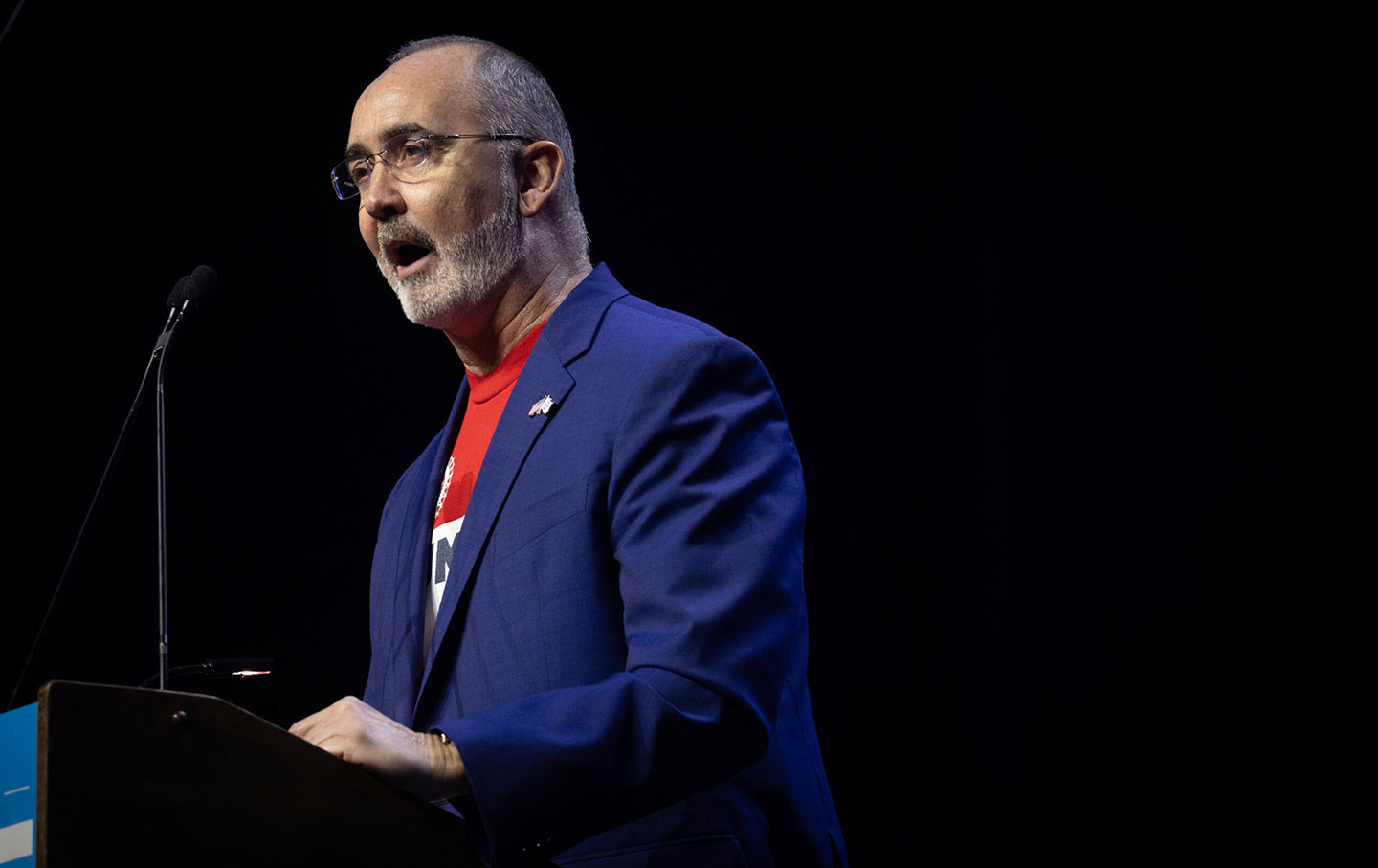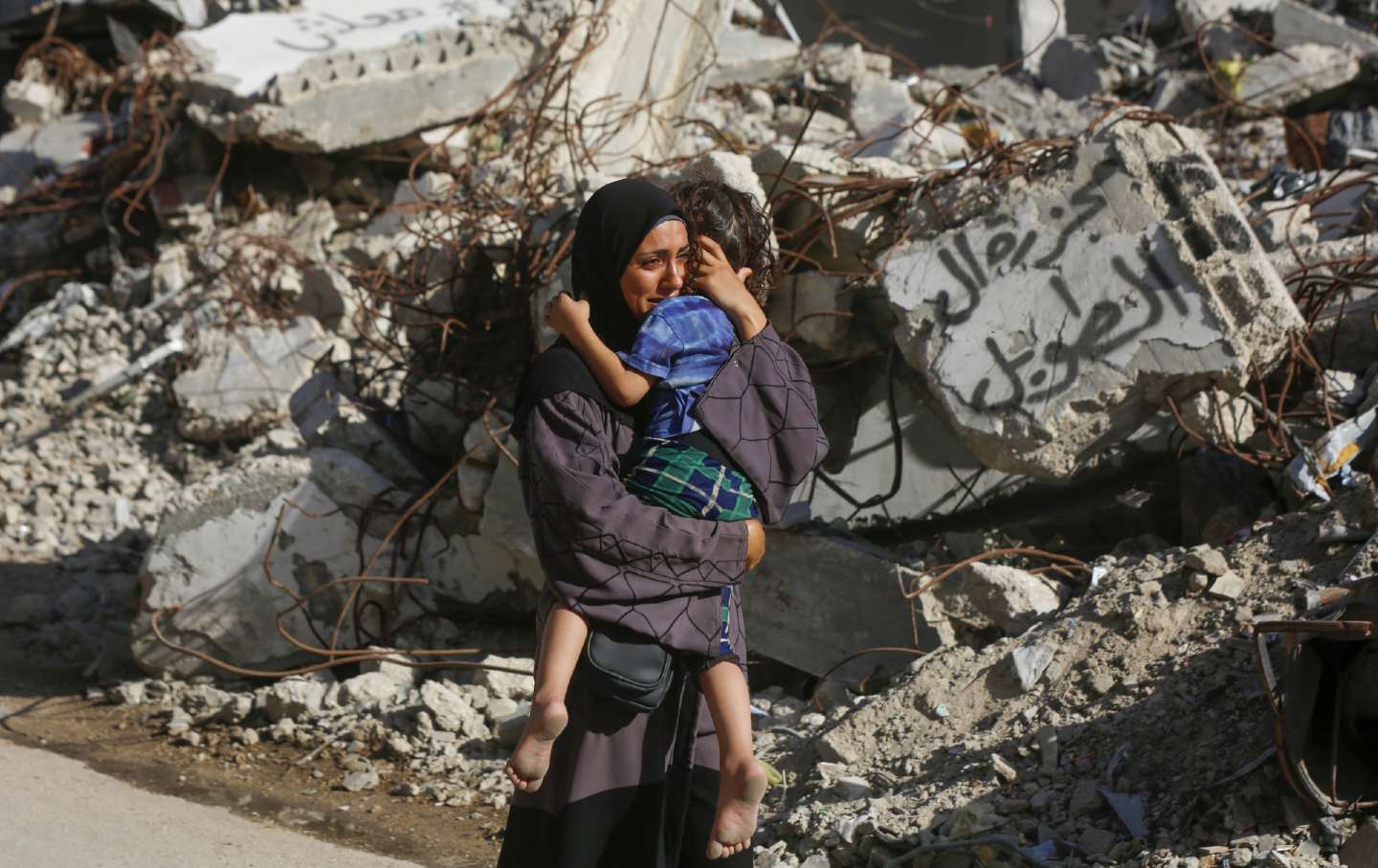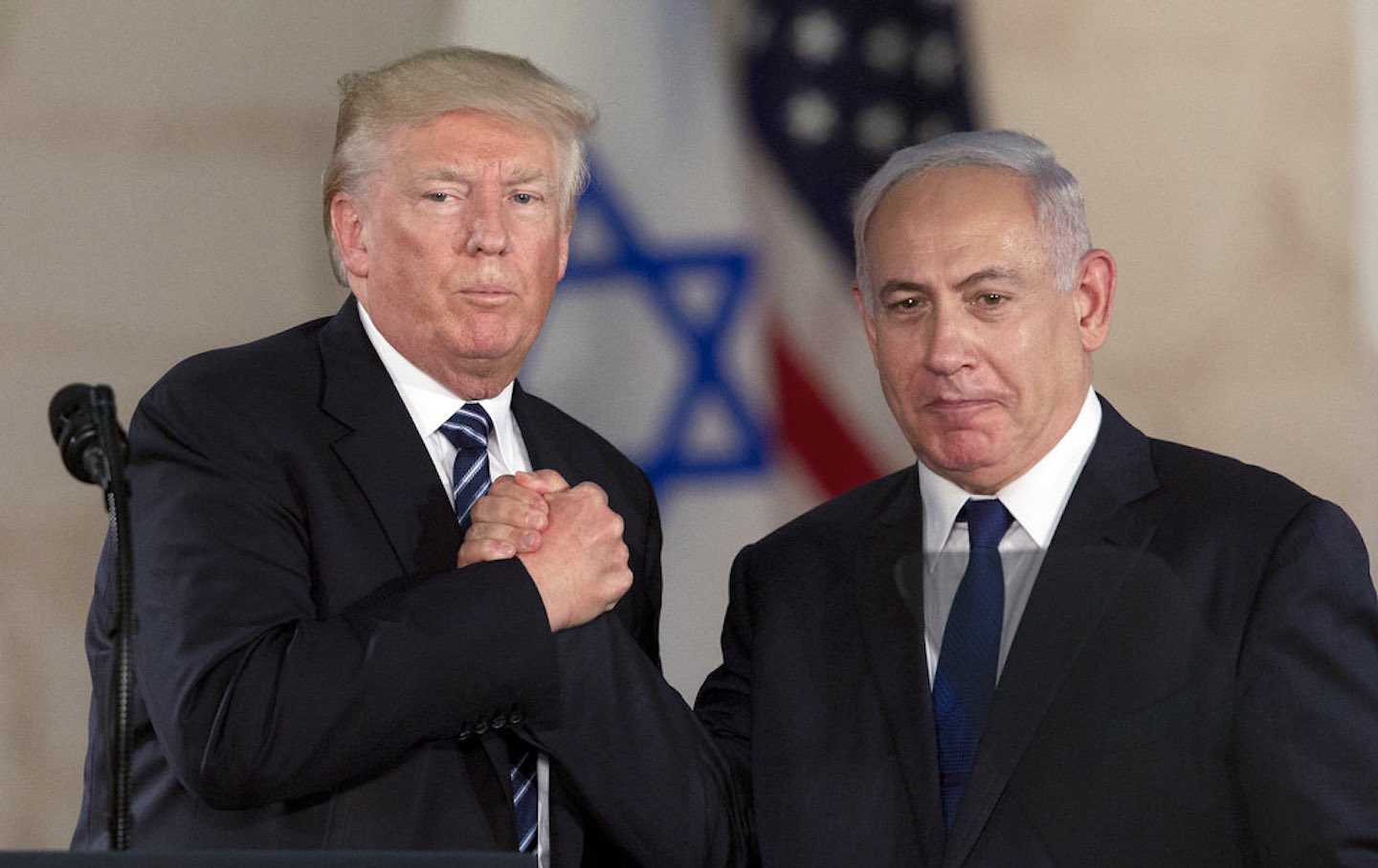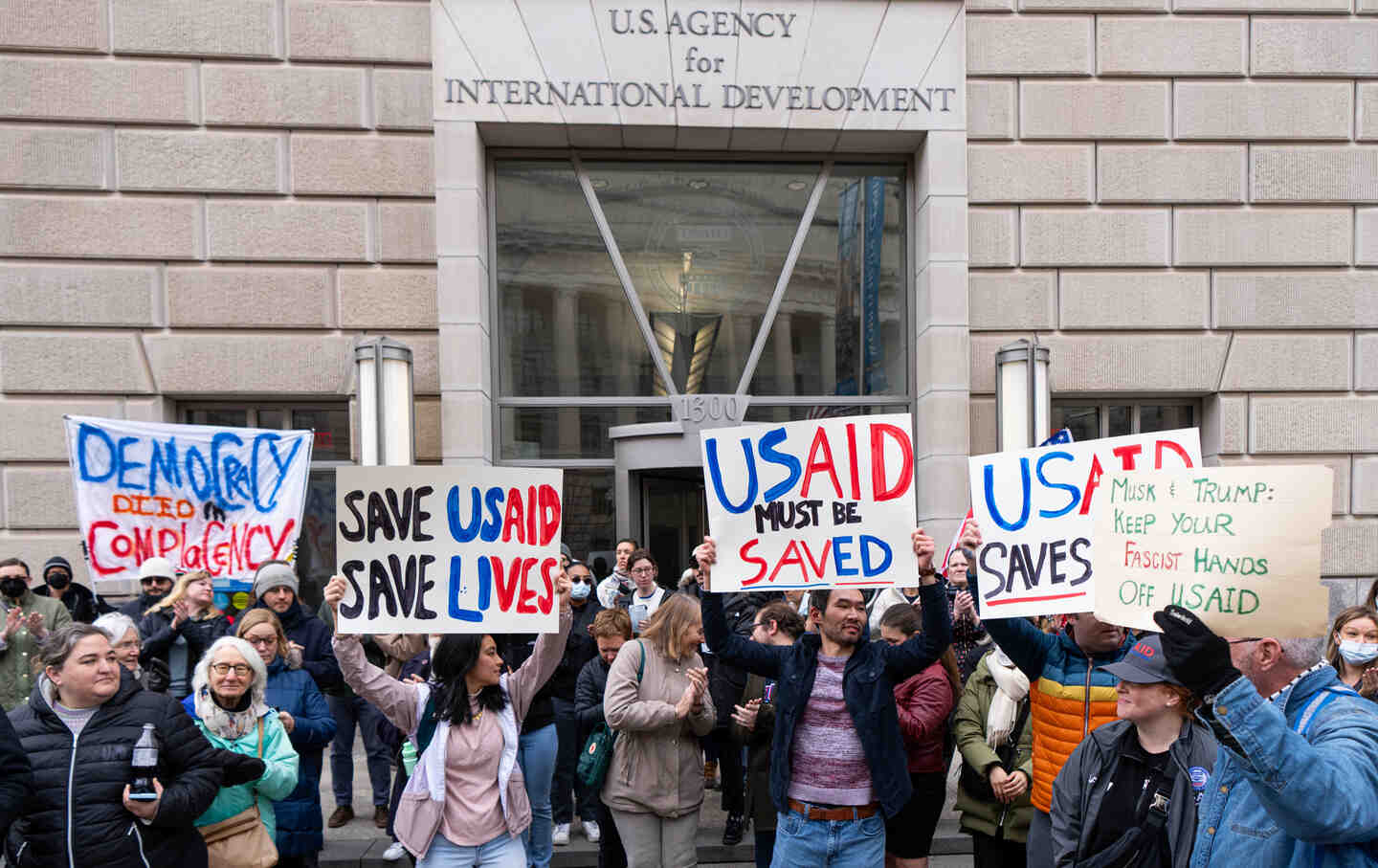Will Israel Drag the US Into a New Forever War?
Regional war isn’t inevitable if the Biden administration delivers a firm message to Israel: The US will provide neither weapons nor funding for an Israeli war on Hezbollah.
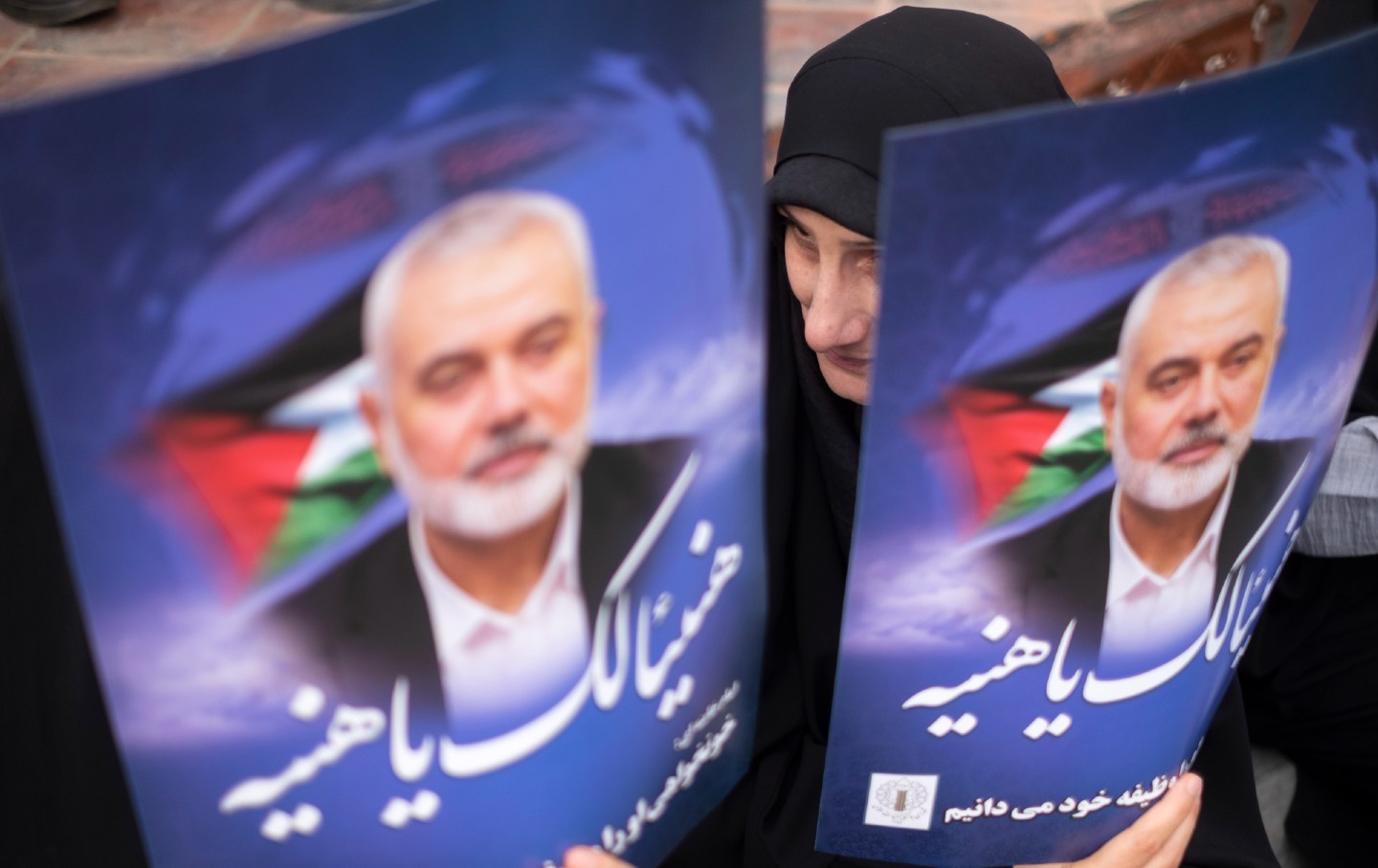
Iranian mourners hold portraits of Hamas leader Ismail Haniyeh during a funeral ceremony for him and his bodyguard Abu Shaaban in Tehran, Iran, on August 1, 2024.
(Morteza Nikoubazl / NurPhoto via Getty Images)
Israel’s war in Gaza has reignited regional tensions in the Middle East. In January, Iran-aligned militias in Iraq resumed attacks on US troops after a two-year hiatus, resulting in the deaths of three American soldiers. Meanwhile, the Houthis effectively blocked the Red Sea to commercial shipping, while ongoing transborder attacks between Israel, Iran, and Hezbollah have kept the region on edge. Until now, however, the brutality of full-scale war has been largely contained within Gaza. Yet Israel’s assassinations of senior Hezbollah leader Fuad Shukr in Beirut and Hamas’s political chief Ismail Haniyeh in Tehran this week have made the conflict more dangerous than ever, with the potential to escalate into a bloody regional war that could kills tens of thousands and draw America into a new “forever war” in the Middle East.
Until now, both Iran and Hezbollah’s actions have demonstrated their preference to avoid direct conflict, despite provocative Israeli actions. Tehran, for example, viewed the strike that killed a senior commander of Iran’s Islamic Revolutionary Guard Corps outside its consulate in Syria on April 1 as a significant escalation, but after sending a barrage of missiles and drones that were largely intercepted, did not pursue further escalation. Hezbollah, too, has consistently sought to stay out of the conflict, even when faced with targeted Israeli strikes on senior figures like Hezbollah chief Hassan Nasrallah’s brother-in-law and other strikes deep within Lebanese territory.
So far, Israel has avoided opening a northern front that would complicate its operations in Gaza. The extent to which Israel needed assistance from the US Navy and even Jordan—after Iran’s response to the Israeli attack on its consulate in Damascus—served as a wake-up call for some within Israel’s political and military circles. Still, according to the Armed Conflict Location and Event Data Project, between October and June, Israel conducted 83 percent of the transborder attacks on targets in Lebanon, displacing approximately 90,000 people, while Hezbollah’s attacks on northern Israel have displaced about 60,000. The Israeli military has approved operations against Hezbollah, and Israel’s latest attacks on senior officials appear intended to goad Hezbollah or even Iran into outright war.
There’s a dangerous assumption among some within Israel’s government that it can dislodge Hezbollah from Lebanon. A war between Hezbollah and Israel would cause tens of thousands of deaths and trigger a humanitarian crisis. It would also jeopardize the US embassy in Beirut and the safety of thousands of American citizens in Lebanon and Israel. It could trap 86,000 US citizens in Lebanon, a repeat of what happened in 2006 during Israel’s 34-day war with Hezbollah. Even if Israel manages to preemptively destroy or intercept much of Hezbollah’s rocket arsenal, it would still face the challenge of dealing with a militant group deeply embedded in urban areas and equipped with a vast network of tunnels, much like Hamas. This would be made more difficult by the fact that even some of Israel’s closest allies are thinking of reducing their military support because of the scale of Israel’s accused war crimes in Gaza.
Israel and the United States must also contend with attacks from the Houthi movement in Yemen. On July 19, the Houthi government claimed responsibility for a drone attack on Tel Aviv near the US embassy that killed one Israeli civilian and injured 10. This was the first time the Houthis caused Israeli casualties.
In the aftermath of October 7, the Houthis, also known as Ansar Allah, began targeting shipping vessels in the Red Sea in an effort to impose upon the Israeli Red Sea port of Eilat a blockade similar to the one Israel has maintained on Gaza since 2007. On January 11, the US and a coalition of countries launched Operation Prosperity Guardian to eliminate the Houthi threat to global shipping. Interestingly, other than Bahrain, no Arab country agreed to join the coalition. Given the level of global animosity toward Israel, especially among Arab and Muslim countries, no Arab leader wished to be seen as joining the United States in attacking the group. The Houthis have benefited from the positive PR; although their legitimacy inside Yemen remains contested, they have enhanced their reputation in the eyes of a global public frustrated by the inability of the United Nations, the International Criminal Court, or International Court of Justice to impose consequences on Israel.
Israel responded to the attack on Tel Aviv by bombing the Red Sea port of Hodeidah, killing six and wounding 87. Hodeidah port is a lifeline for the population of northern Yemen, approximately 27 million people. While briefing the UN Security Council, the acting under-secretary general for humanitarian affairs, Joyce Msuya, stressed the importance of the port: The majority of the Yemeni population rely on imports for basic supplies, including 85 percent of food, the majority of which arrives through Hodeidah. Out of concern about the impact on Yemeni civilians, US and British operations to take out Houthi military installations have avoided hitting the port. Yet Israeli media crowed about the attack on civilian infrastructure. Israel has clearly demonstrated that it does not value the lives of Arabs, whether Palestinian or Yemeni.
A major challenge for US policymakers is that Iran and its proxies appear to consider US troops in the region legitimate targets for retaliation. This would mirror Washington’s own stance, holding Iran accountable for Houthi and Iraqi militia attacks through its support and funding of those groups. Iran-aligned militias have already resumed attacks on US troops after a hiatus since February. If one of these attacks results in the death of a US service member and becomes politicized, the Biden administration may feel pressured to not only respond but escalate the situation. Washington might retaliate with face-saving strikes, prompting militias to temporarily halt attacks, as they did after an Iran-aligned Iraqi militia attacked and killed three US soldiers at Tower 22, a US military outpost in northeast Jordan. But this outcome is never guaranteed, and a single miscalculation could lead to uncontrollable escalation. The easiest way to have averted this dire moment, of course, would have been to use America’s considerable leverage over Israel to end the war in Gaza and prevent such escalation risks from ever arising.
Iran’s new president, Masoud Pezeshkian, has been thrust directly into a potentially existential calculus for his country. His election was seen as reflecting a possibility of Iran’s reengaging with the United States and the world. But Israel’s killing of Ismail Hanieh took place during his first full day in office, and Iran’s leadership must now determine how they will respond. The decision on how to respond will not be made by Pezeshkian but rather by Supreme Leader Ali Khamenei and the country’s security establishment. Khamenei has already stated on social media that “it is our duty to take revenge” and has reportedly ordered retaliation against Israel. Worse, from Tehran’s perspective, pursuing nuclear capability has likely never seemed more necessary. Israel’s behavior seems to indicate that it is intent on provoking a regional war, and eventually Hezbollah and Iran are likely to conclude that exercising restraint is only putting them at risk of further Israeli attacks; meanwhile, the Houthis are likely to try to replicate or expand their successful drone strike on Tel Aviv. The Houthis have a high tolerance for risk and endured seven years of attacks from the Saudi-led, US-backed coalition. Their confrontational approach in the Red Sea has also proven to be a highly effective recruitment strategy.
The key question is whether the United States can avoid being drawn into an escalating regional conflict. If Israel enters a full-scale war with Hezbollah—or worse, directly with Iran—Washington will almost certainly feel compelled to intervene, starting with its naval forces in the region. That is why it’s crucial for the Biden administration to restrain Israel from further escalation—though Israel and Iran may already be locked into an escalatory spiral. But regional war isn’t inevitable if Washington steps up with a firm message to Israel that it will provide neither weapons nor funding for an Israeli war on Hezbollah. If the Biden administration once again fails to make its red lines clear to Israel, Biden will have only himself to blame if his final months in office, and his party’s electoral chances, are consumed by yet another war in the Middle East.
Hold the powerful to account by supporting The Nation
The chaos and cruelty of the Trump administration reaches new lows each week.
Trump’s catastrophic “Liberation Day” has wreaked havoc on the world economy and set up yet another constitutional crisis at home. Plainclothes officers continue to abduct university students off the streets. So-called “enemy aliens” are flown abroad to a mega prison against the orders of the courts. And Signalgate promises to be the first of many incompetence scandals that expose the brutal violence at the core of the American empire.
At a time when elite universities, powerful law firms, and influential media outlets are capitulating to Trump’s intimidation, The Nation is more determined than ever before to hold the powerful to account.
In just the last month, we’ve published reporting on how Trump outsources his mass deportation agenda to other countries, exposed the administration’s appeal to obscure laws to carry out its repressive agenda, and amplified the voices of brave student activists targeted by universities.
We also continue to tell the stories of those who fight back against Trump and Musk, whether on the streets in growing protest movements, in town halls across the country, or in critical state elections—like Wisconsin’s recent state Supreme Court race—that provide a model for resisting Trumpism and prove that Musk can’t buy our democracy.
This is the journalism that matters in 2025. But we can’t do this without you. As a reader-supported publication, we rely on the support of generous donors. Please, help make our essential independent journalism possible with a donation today.
In solidarity,
The Editors
The Nation



